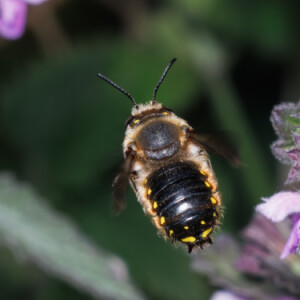Mr Spikes
By yesterday evening the Boy Wonder was quite poorly - he even left the table part way through dinner and took himself off for a short sleep on the sofa, before coming back to finish his meal - and at bedtime, after consulting by phone with a parent, I dosed him with Calpol. It took a while to work, but eventually his coughing quietened down and he was able to stop fidgeting around the bed and get properly off to sleep.
It was apparently a different child who sprang awake at 6am today and asked if it was time to get up yet. After four rounds of chocolate toast he spent part of the morning building Lego figures with R, and the rest of it swinging and doing water play in the garden. We then drove him back over to Wales, and met up with L, G, and the Baby Brother for a very nice pub lunch at Usk. Back at home R and I tidied the house, and then, because I was on a roll by this time, I went and tidied the wildlife pond and thinned out the emergent vegetation, to make things easier for the dragon nymphs we hope will be climbing out of the water very soon.
I also found a few minutes to go down to Tilly's field, where Wool Carder season has arrived. These fierce little bees always gladden my heart, and happily there are currently three - a male and two females - working the black horehound at the edge of the field. Both today's images show the male. I've included the second one partly because it gives a better view of his abdominal markings, and the vicious spikes with which he's armed; and partly because bees aren't especially easy to photograph in flight, and I like to swank a bit whenever I manage it.
I've never seen a Wool Carder's spikes being used, I'm relieved to say, because they're a weapon of last resort, but their function is to kill rival males during territorial disputes. The first line of attack from a territory holder is always a fast shoulder charge, which shows his strength, and is usually enough to get rid of the interloper, who's generally a smaller male who hasn't managed to establish a territory of his own. It's only if the incursion continues that the resident bee will attempt to seize his rival, and then bend his abdomen around to crush the victim between his thorax and those wicked abdominal spikes.
The safest strategy for a smaller male, which I've witnessed a couple of times, is to nip in to the dominant male's territory while the boss is occupied elsewhere, and quickly try his luck on any females he can find. If one of them is receptive, mating takes just a few seconds, and if luck stays with him he can be gone again before he's spotted.


Comments
Sign in or get an account to comment.


